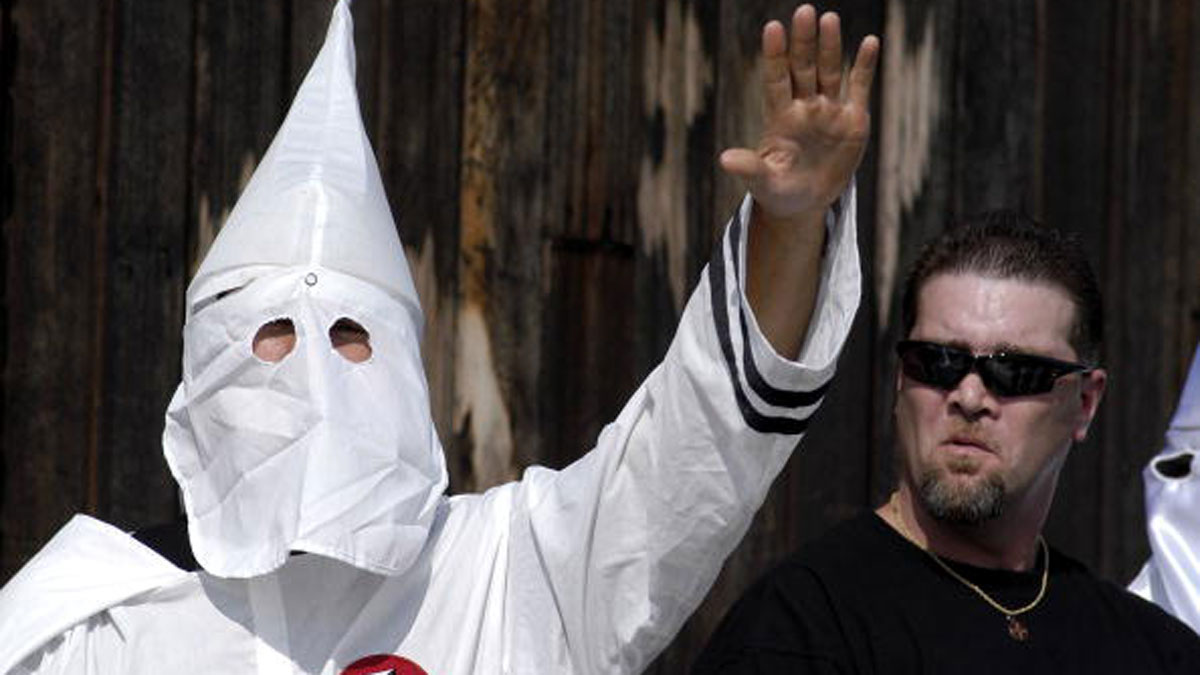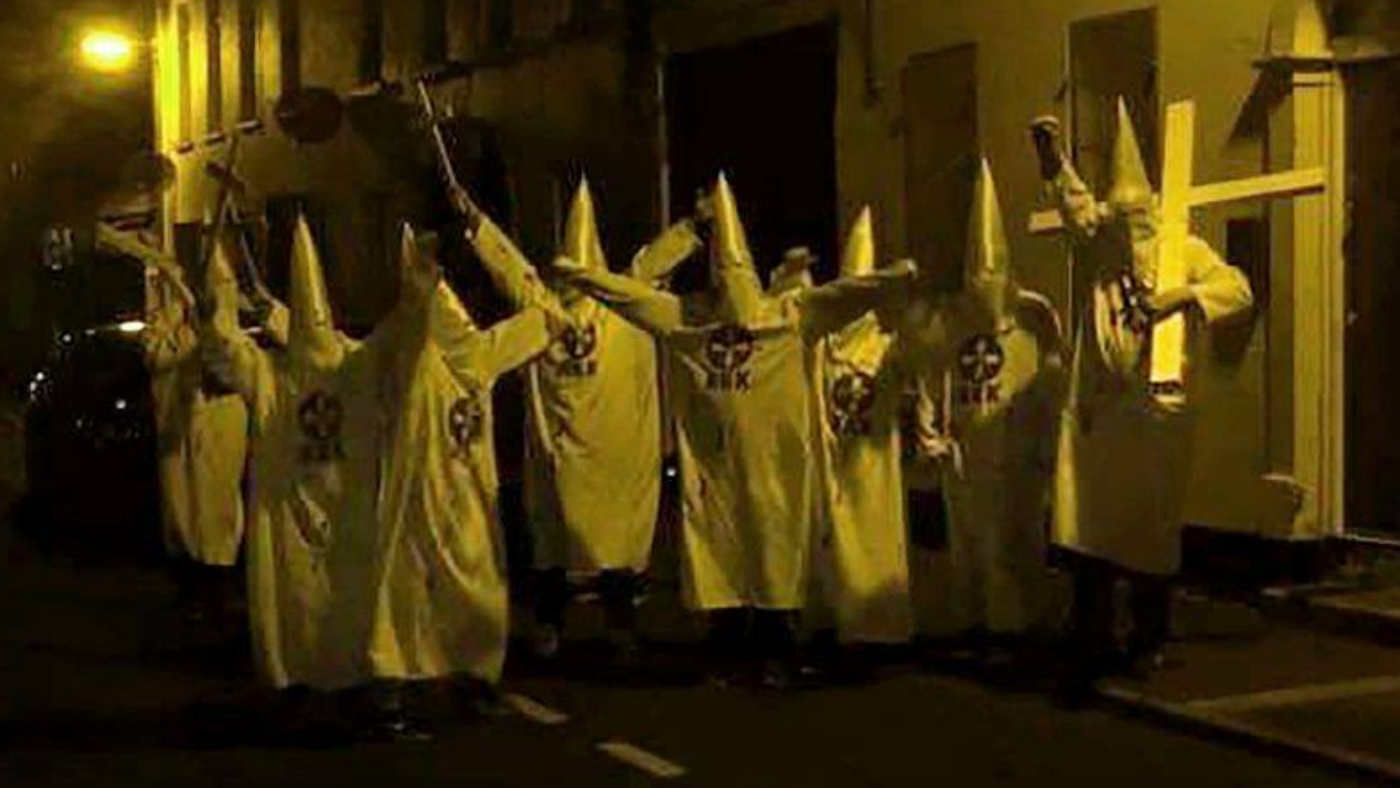Ku Klux Klan boasts rising numbers as racial tensions soar
The historic hate group is still alive and well – but how much influence do the hooded Klansmen really hold?

A free daily email with the biggest news stories of the day – and the best features from TheWeek.com
You are now subscribed
Your newsletter sign-up was successful
As America struggles to come to terms with last month's murder of nine African American worshippers in a church in South Carolina, the number of new recruits joining the Ku Klux Klan is growing.
History
The KKK was first established after the American Civil War by a small group of Confederate veterans who opposed the abolition of slavery and African Americans being granted basic civil rights. Their numbers quickly grew and their white hoods, flowing sheets and fiery crosses became the most recognisable symbols of racism and white supremacy. "Outlandish titles (like imperial wizard and exalted cyclops), violent "night rides," and the notion that the group comprised an "invisible empire" conferred a mystique that only added to the Klan's popularity," says the Southern Poverty Law Centre, which monitors hate groups. The Klansmen were known for their brutality. Lynchings, tar-and-featherings, church burnings and rapes were commonly used against anyone who challenged their ideals. Even though Klan members have primarily targeted black people and their supporters, they have also launched attacks against Jews, Catholics, immigrants and gay and transgendered people. Federal legislation that targeted Klan-perpetrated violence halted their advance in the 1870, but the organisation has since witnessed numerous resurgences – particularly during the 1920s and 1960s. At its peak the KKK had over four million members nationwide and boasted huge social and political influence, with hundreds of KKK-backed candidates elected to local, state, and even federal office.
The Week
Escape your echo chamber. Get the facts behind the news, plus analysis from multiple perspectives.

Sign up for The Week's Free Newsletters
From our morning news briefing to a weekly Good News Newsletter, get the best of The Week delivered directly to your inbox.
From our morning news briefing to a weekly Good News Newsletter, get the best of The Week delivered directly to your inbox.
What do they stand for?
Mark Pitcavage, the director of investigative research for the Anti-Defamation League, describes the Klan as a "group of hard-core white supremacists that are motivated by a belief that the white race is in danger of extinction." But the KKK has been on a mission to rebrand itself, opening its doors to black, Jewish and gay people last year. It doesn't want to be described as a hate group, insisting it a deeply Christian organisation with a strict policy of non-violence. "We do not hate anyone," Frank Ancona, the imperial wizard of the Traditionalist American Knights told CNN. "The true Ku Klux Klan is an organization that is looking out for the interests of the white race. It is a fraternal organization, and we do good works."Those outside the organisation, however, remain unconvinced. "While some factions have preserved an openly racist and militant approach, others have tried to enter the mainstream, cloaking their racism as mere 'civil rights for whites,'" says the Southern Poverty Law Centre.
Are they still operating and how much influence do they have?
Experts estimate that there are currently between 5,000 and 8,000 Klan members operating across the country. A greater number of KKK organizations exist today than at any other point in the group's long history, but the majority of them are "small, marginal and lacking in meaningful influence," Ku Klux Klan scholar David Cunningham told PBS. However, he highlights an important caveat: "marginal, isolated extremist cells themselves can become breeding grounds for unpredictable violence."
A free daily email with the biggest news stories of the day – and the best features from TheWeek.com
An upcoming Channel 4 documentary looks into how the Traditionalist American Knights – a Missouri-based faction of the group who claim to be the fastest growing Klan in the country – are attempting to expand their membership base.
"What we uncovered was truly shocking. Anyone who thinks the Klan is a remnant of a bygone America will be disturbed to learn their numbers are growing," says British director Dan Vernon, who spent seven months with the Klansmen.
"It's very unsettling to imagine that while America is taking steps to heal the injustices of its past, there are groups out there whose beliefs are likely to further inflame racial divisions, to their own gain."
[[{"type":"media","view_mode":"content_original","fid":"83125","attributes":{"class":"media-image"}}]]
Inside The Ku Klux Klan airs on Channel 4 at 10pm tonight
-
 Labor secretary’s husband barred amid assault probe
Labor secretary’s husband barred amid assault probeSpeed Read Shawn DeRemer, the husband of Labor Secretary Lori Chavez-DeRemer, has been accused of sexual assault
-
 Trump touts pledges at 1st Board of Peace meeting
Trump touts pledges at 1st Board of Peace meetingSpeed Read At the inaugural meeting, the president announced nine countries have agreed to pledge a combined $7 billion for a Gaza relief package
-
 Britain’s ex-Prince Andrew arrested over Epstein ties
Britain’s ex-Prince Andrew arrested over Epstein tiesSpeed Read The younger brother of King Charles III has not yet been charged
